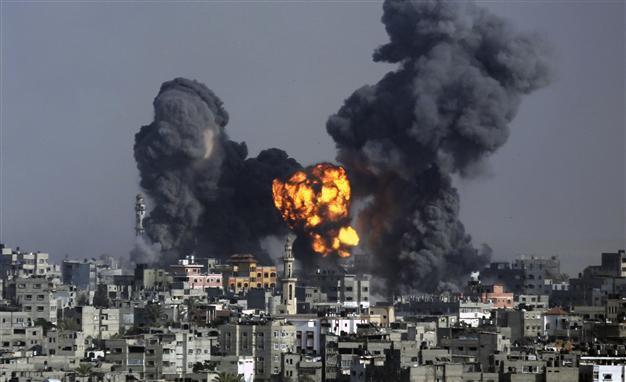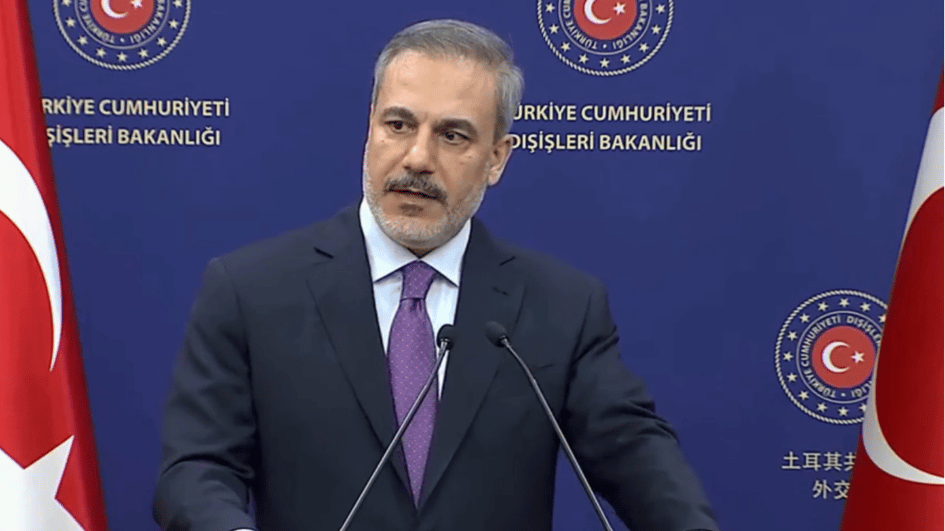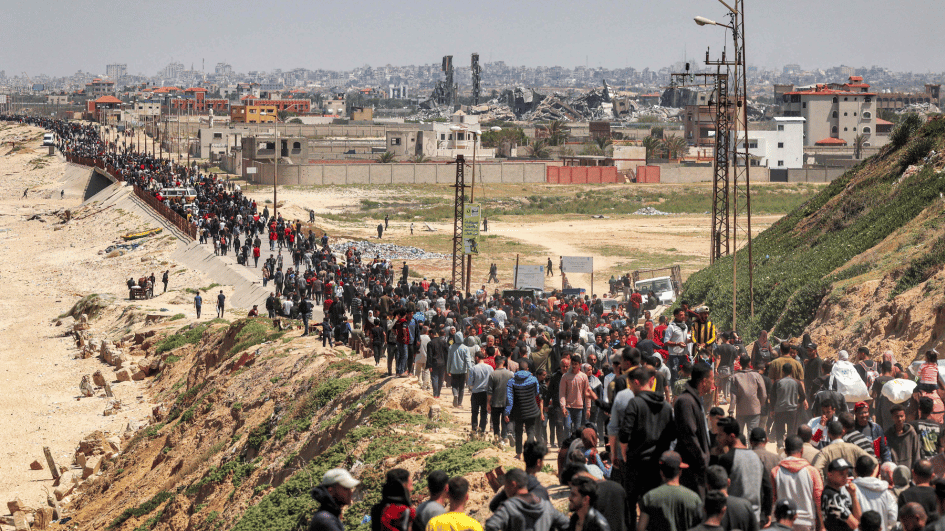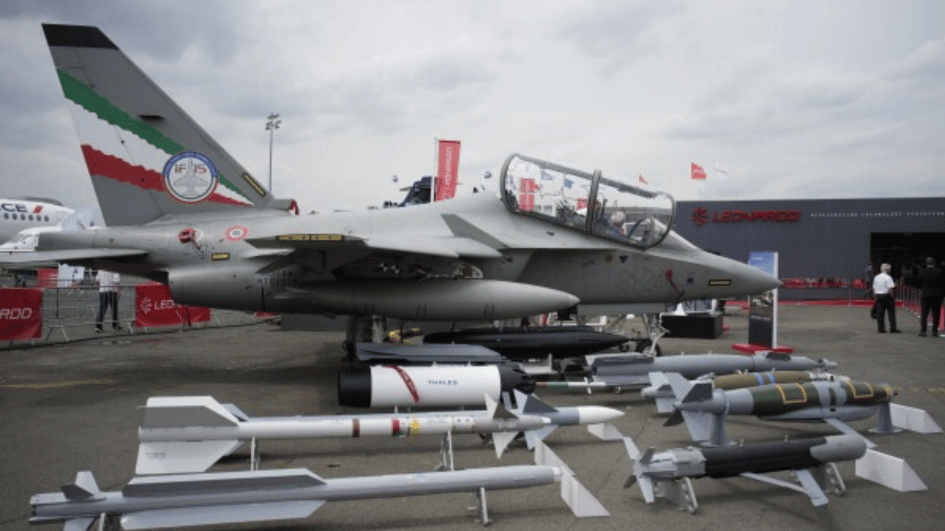Hamas rejects Gaza truce despite Turkey's fresh bid
Sevil ERKUŞ - ANKARA Agence France Press - DOHA

Smoke and fire from the explosion of an Israeli strike rise over Gaza City. AP Photo
Turkey has been working behind the scenes to bring a cessation to hostilities to the conflict between Hamas and Israel in Gaza, leaning on the Hamas leader to agree to a truce pending negotiations on a more thorough settlement, before the Palestinian group rejected the latest bid.In a visit to Ankara last week, Palestinian President Mahmoud Abbas asked Turkish Prime Minister Recep Tayyip Erdoğan to convince Hamas’ Khaled Mashaal to accept an immediate cease-fire deal with Israel, Palestinian Ambassador to Turkey Nabil Maarouf told the Hürriyet Daily News on July 23.
Maarouf added that Erdoğan discussed the matter with Mashaal by phone on the same night.
“Erdoğan, at midnight Sahur time, talked with Mashaal to convince him. On the second day, someone from here went to Doha to meet Mashaal for the same purpose,” he said, noting that Turkish leaders agreed with Abbas’ suggestion that Hamas should first agree to an immediate truce before negotiating the terms of the deal.
“Turkish leaders responded positively that we should make a cease-fire first; we should stop the killings of people now and then discuss the details,” Maarouf said.
A Turkish official told the Daily News that Turkey was "continuing efforts within the framework set by Abbas."
Last week's Egyptian plan for a truce in Gaza was initiated by Abbas, Maarouf also said, adding that he asked Egyptian officials to secure a cease-fire, after which delegations would come from Israel, Hamas and the rest of Palestine to Cairo within 24 hours to launch five days of negotiations.
“All the groups in Gaza refused, because they want to guarantee something before the cease-fire. They want the Rafah border to be opened, the release of prisoners from the Gilat Shalit deal who were arrested again by the Israelis, free access to the port, and they want to build an airport [in Gaza] so that people can go and come without complications at the borders. The main aim of these is guaranteeing a new life to the Palestinians in Gaza,” said the ambassador.
The main stumbling block was the advance guarantees for such demands, Maarouf added.
'Israelis don’t want Turkey to be in the picture'
Asked if Mashaal failed to agree to the deal despite Erdoğan’s call, Maarouf said, “I can’t say that they could not convince him, but what I can say is that Turkish leaders believe that we have to stop the killing of the Palestinians and then negotiate the terms.”
Following Erdoğan’s phone call and the special envoy’s visit to Mashaal, Abbas visited Doha over the weekend and met Qatari officials and the Hamas leader, but failed to reach a final decision.
“Mashaal made a statement [to the effect] that we understand what President Abbas is doing and we appreciate it, but we did not give him an immediate answer. This means that they are studying the proposal about a cease-fire,” he added.
The ambassador also denied that Turkey "sabotaged" the cease-fire initiatives, as claimed by Israel.
“I am sure the Israelis don’t want Turkey to be in the picture. They don’t mind if the Qataris interfere with the Egyptians, but they prefer not to see the Turks in the process,” Maarouf said.
“Before the Mavi Marmara incident, Turkey had good relations with Israel. Turkey was always talking about being a facilitator, a meditator. Turkey tried many times. It’s good for us if we have a brotherly country that exerts pressure on Israel, but the facts are that Israel will never fall under any pressure apart from the U.S. Because they are sure the U.S. is 100 percent or more with them,” he added.
Hamas insists on its condition about the blockade
Hours after Maarouf's statement, Hamas rejected a cease-fire with Israel unless the blockade on the Gaza Strip is lifted.
"We reject it today ... and will reject it in the future" a cease-fire before negotiations on Hamas’s demands, which include lifting years of blockade against the Palestinian enclave, Hamas chief Mashaal told reporters in Doha late July 23.
Lifting the eight-year blockade is a main demand of Hamas which also wants the opening of the Rafah border crossing with Egypt and Israel to free prisoners.
As international calls for an end to the fighting in Gaza mount, Mashaal insisted that the Islamist Hamas "welcomes all efforts to end the aggression" and "does not object" to mediation by any party, including Egypt.
"We will not accept any initiative that does not lift the blockade on our people and that does not respect their sacrifices," he said.
Egypt, whose President Abdel Fattah el-Sisi has sought to isolate the militant Palestinian movement in the neighboring Gaza, had tried to broker a truce between Israel and Hamas.
Hamas had rejected the cease-fire proposal, which it said was favourable to Israel.
It argues that Egypt’s proposal, which is backed by the United States, United Nations and Arab League, would allow Israel to dictate if and when to ease its blockade on Gaza.
"Let us agree on achieving our demands and we will then agree on the zero-hour for a ceasefire," Mashaal said.
He appealed to the international community and NGOs to "come to the aid of Gaza and not wait until after the war ends."
"I call today for opening border crossings to allow the entry of aid convoys" to Gaza Strip, which needs "fuel, food and electricity," he said.
"We are more concerned [than any other party] about a humanitarian truce, like last Thursday [July 17] ... for evacuating casualties and assisting the population," he said.
"We are not closing the door to a humanitarian truce ... that would not manuever around demands of the resistance," he added.
Mashaal insisted that his movement wants the "aggression to stop tomorrow, today, or even this minute. But lift the blockade with guarantees and not as a promise for future negotiations," he said, adding that "we will not shut the door in the face of any humanitarian ceasefire backed by a real aid program."
Charity Oxfam said July 23 that thousands of Palestinians have fled their homes, but have nowhere safe to shelter from Israeli airstrikes and warned that supplies of water and food are dangerously low.
The 16-day conflict has so far killed 695 Gazans, 34 Israelis and a Thai worker.
"We do not want a war and we do not want it to continue, but we will not bow in front of it," said Mashaal.
"Nobody could disarm the resistance," he said, setting two conditions to demilitarize Gaza, an Israeli demand: "The end of occupation and the disarmament of Israel."
















